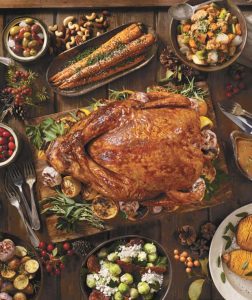By Colin E. Champ, MD, CSCS – Radiation Oncologist
 Yu’ve probably heard people say that everyone gains weight during the holidays. In fact, it is a widely circulated “fact” that most Americans gain 5 pounds during the period between Halloween and New Year. Could this be true? Are we really eating THAT much Trick-or-Treat candy and pumpkin pie? Are all of those delicious casseroles grandma makes that irresistible? According to a study published in the New England Journal of Medicine in March, 2020, that number may be a little bit exaggerated.
Yu’ve probably heard people say that everyone gains weight during the holidays. In fact, it is a widely circulated “fact” that most Americans gain 5 pounds during the period between Halloween and New Year. Could this be true? Are we really eating THAT much Trick-or-Treat candy and pumpkin pie? Are all of those delicious casseroles grandma makes that irresistible? According to a study published in the New England Journal of Medicine in March, 2020, that number may be a little bit exaggerated.
How much weight is really being gained during the holidays?
The study followed 195 adults during a 5-month time period. They were weighed prior to the holidays (mid-October), during the height of the season (November-January), and a final time post-holiday (February/March). The results showed that there was, in fact, weight gain for most of the participants. However, the study revealed that the average weight gain was much lower than the 5 pounds everyone talks about. Instead, the average weight gained during the trial period was closer to 1 pound.1 Is that such a big deal?
How does it affect us in the long run?
Obesity has become one of America’s greatest health concerns over the last 10-15 years. It has been shown to be a major contributor to heart disease, diabetes, and several other serious health problems. Studies show that Americans gain an average of 0.4-1.8 pounds each year of their adult lives. That doesn’t seem like a big problem until we remember that that is EVERY year, meaning in that in 10 years, we’ve gained around 10 pounds. It also become more troubling when we think about how difficult it is to lose the weight once it has been put on. For this reason, it is important to learn when and why people gain weight so that effective strategies to prevent obesity can be developed.2
Furthermore, when researchers follow individuals who let the wheels come off during the holidays, they find that they put a small amount of weight on that never comes off. Studies suggest that this periodic weight gain is likely responsible for the majority of weight gain that many individuals experience throughout their adult life.3
How can we keep from gaining holiday weight?
The obvious solution to this problem is NOT to gain weight during the holidays. If you don’t gain, you don’t have to lose. Below are some practical steps you can take this holiday season to keep you from gaining weight.
1. Eat at home as much as you can. It can be difficult to find healthy options when eating out. Keeping your kitchen stocked with healthy foods and planning well-balanced meals can cut down on weight gain. When going out with friends, make good choices. Maybe a grilled chicken breast might be just as satisfying as a plate of pasta smothered in cream sauce.
2. Fill up on fruits and vegetables. Data shows that people who eat more fruits and vegetables are less likely to become obese. At every meal, focus on filling at least half of your plate with fruits and vegetables.
3. Keep track of your diet, exercise and weight. The evidence shows that weighing yourself on a regular basis and keeping a journal to track diet and exercise really works.
4. Fit in exercise whenever you can. Evidence published by the U.S. Department of Health and Human Services finds adding physical activity to your day in any way that you can helps to prevent weight gain and provides a host of other benefits including lowering blood pressure, reducing anxiety and improving your mood. Systematic reviews show that burning the calories you consume is an effective strategy for preventing weight gain. That may mean more exercise than you think. One review found that in order to maintain weight, participants need to burn 1,500 to 2,000 calories per week exercising. That’s the equivalent of walking about an hour a day at a moderate pace or running 13 miles a week. But you don’t have to do it all at once – your physical activity accumulates throughout the day. Take a quick walk during your lunch hour or use YouTube for a quick exercise video in between meetings.4
Dr. Colin Champ, MD, CSCS
Dr. Colin Champ, MD, CSCS, is a radiation oncologist with board certifications in radiation oncology and integrative and holistic medicine. Dr. Champ is a certified strength and conditioning specialist, and his research interests include the prevention and treatment of cancer with lifestyle modification, including exercise and dietary modification.
INSPIRE EXERCISE MEDICINE
239.429.0800
www.Inspireem.com
3555 Kraft Road, Suite 130, Naples, FL 34105
References:
1. Yanovski, J.A. et al. (1970) A prospective study of holiday weight gain: Nejm, New England Journal of Medicine. Available at: https://www.nejm.org/doi/full/10.1056/NEJM200003233421206 (Accessed: November 16, 2022).
2. Holiday weight gain slight, but may last a lifetime (2000) Eunice Kennedy Shriver National Institute of Child Health and Human Development. U.S. Department of Health and Human Services. Available at: https://www.nichd.nih.gov/newsroom/releases/
holidayweightgain.
3. Champ, C.E. (2022) Keeping the wheels on for the holidays (and always), Colin Champ. Available at: https://colinchamp.com/
keeping-the-wheels-on-for-the-holidays-and-always/.
4. Holiday weight gain stays with Us (no date) Evidence Based Living. Available at: https://evidencebasedliving.human.cornell.edu/
2020/12/11/holiday-weight-gain-stays-with-us/









